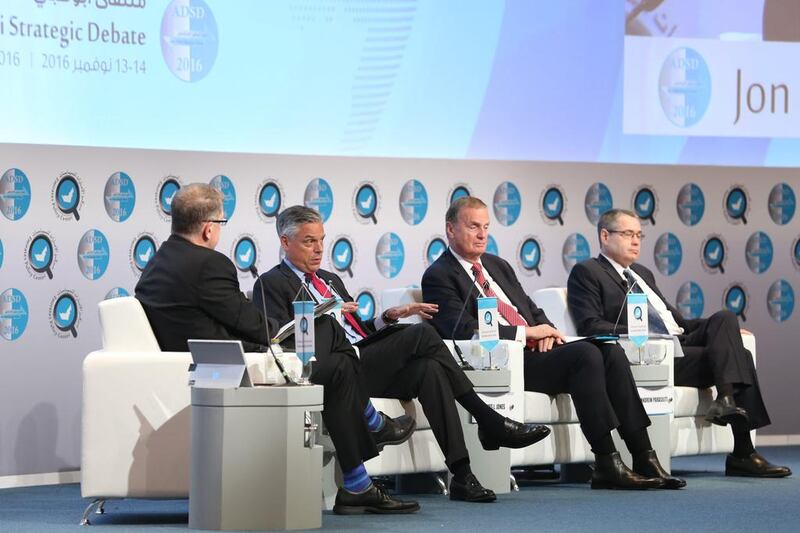ABU DHABI // The UAE has an important role in uniting Arab countries behind issues such as the Syrian crisis, a conference heard on Monday.
Amr Moussa, former secretary general of the Arab League and Egyptian minister of foreign affairs said it was crucial that Saudi Arabia and Egypt should overcome their differences and share the same foreign policy objectives.
“We need to get serious now. Even if there are disagreements they could be set aside or postponed,” Mr Moussa said on the final day of the Abu Dhabi Strategic Debate.
“But for everyone’s welfare, Saudi Arabia and Egypt should be on the same strategic political line.
“Is it logical that in Syria the countries who hold the baton of power and opinion are Russia and the US from one side, and Turkey and Iran from the other, while Syria is an Arab country and none of us are present?”
A strong Arab presence is only possible with the kingdom and Egypt together, “so if we are in dispute it will be a crisis”.
“Who will speak in the name of the Arab world then?” Mr Moussa asked.
He said the respect for the UAE’s leaders would allow them to unite the countries.
“The UAE’s recent moves in that regard are good and positive, and we do not only hope that they will be achieved but also succeed,” Mr Moussa said.
There has been tension between Cairo and Riyadh in recent weeks over issues such as UN resolutions on Syria, oil experts and Egypt’s reluctance to support the conflict in Yemen.
Panellists and audiences also discussed the influence Donald Trump may have on policies including the Iranian nuclear agreement and Tehran’s meddling in the region.
“I see that there is no way that the Arab world will be under Turkish or Iranian leadership. They are not Arabs and don’t speak our language,” said Mr Moussa.
On Palestine, Mr Moussa said the current situation could not continue “under the occupation’s administration”.
“There should either be a Palestinian state, or the alternative possibility is to have equal citizenship between Arab Muslims, Christians and Jews,” he said.
But the question remains: “Where Trump will stand?”
James Jones, a former US national security adviser, said resolving the Palestinian conflict was “another opportunity lost in the Obama administration”.
“The US has to rise above this very important problem and submit a plan that makes sense and is supported not only by the region, but also in Europe,” Mr Jones said.
Dr Abdulkhalek Abdullah, an Emirati political science professor, voiced his concern over what Gulf countries should do about Mr Trump, who he described as “the angry white man in the White House”.
But Dr Andrew Parasiliti, director of the Centre for Global Risk and Security at the Rand Corporation, said: “I think the US and GCC’s strong relations are based on shared interests – why would that not continue under the Trump administration?”
The relations “deepened under Obama, why not continue?”
“It is a shared international interest and there should be assurance on both sides that this will continue and I see no reason that the relationship should be challenged,” he said.
Steve Clemons, Washington editor-at-large of The Atlantic magazine, described Mr Trump as “a man who is moved by flattery”.
“That is not a mature, global approach,” Clemons said.
hdajani@thenational.ae







